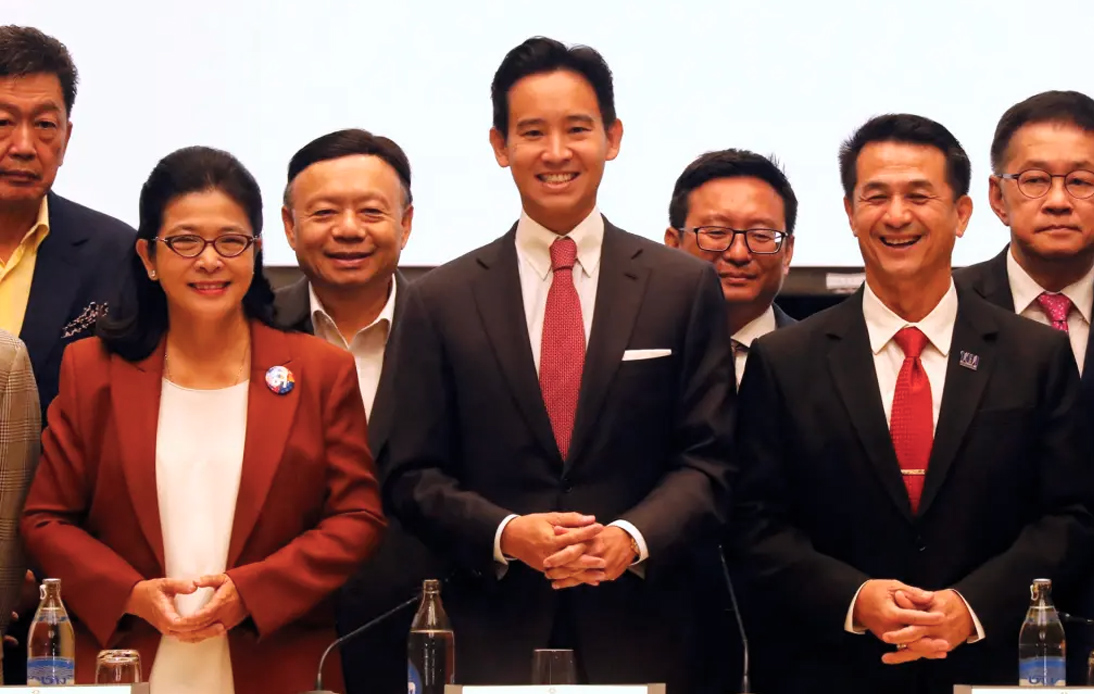
The upcoming meeting this Thursday, June 29, will involve the eight prospective coalition parties discussing a contingency plan, a course of action in case they encounter difficulties in forming a government.
This insight is provided by Prasert Chantararuangthong, the secretary-general of Pheu Thai.
When questioned about Pheu Thai’s fallback plan if the Move Forward Party (MFP) fails in government formation, Mr Prasert answered: “If necessary, the issue may be raised at the June 29 coalition meeting.”
“After the selection of the House speaker, the next step is to select a prime minister. We may have to discuss the matter carefully, particularly the number of MPs who support [each candidate],”Mr Prasert conveyed.
When asked about rumours of financial offers to sway MPs for support in House speaker selection or the prime minister vote, Mr. Prasert replied, “It will not be easy this time because democracy has progressed considerably.”
“In previous elections, renegade MPs could not make it back into parliament,” he elaborated, adding that Pheu Thai never allows its MPs to vote freely on crucial topics like the House speaker selection.
Recently, rampant rumours suggest that rival parties aim to form a government, potentially overthrowing the eight-party coalition led by the MFP. The gossip implies they might attempt this by financially enticing rebellious MPs to garner their support.
In reaction to the rumour about a proposed payment of 100 million baht each to about 60 rebellious MPs for their support, Bhumjaithai Party leader Anutin Charnvirakul responded: “People [in their right mind] wouldn’t pay.”
Probed on whether Bhumjaithai would become part of a Pheu Thai-led coalition government if MFP’s government formation bid fails, Mr Anutin said there have been no indications of the MFP failing yet.
He also revealed that Bhumjaithai hadn’t considered joining a minority government.
In the meantime, Mr Pita stands a good chance of becoming the next prime minister, according to Phichai Ratnatilaka Na Bhuket, director of politics and development strategy programme at the National Institute of Development Administration (Nida).
Mr Phichai added that if Mr Pita fails to win the support of more than half, or 376 out of 750 lawmakers, the eight-party coalition must seek the endorsement of other parties.
Should that support still not suffice, Pheu Thai would be entitled to form a government, Mr Phichai stated.
However, he pointed out that the Democrat Party might play a decisive role in determining Mr Pita’s fate.
On July 9, the Democrats plan to hold a general assembly to choose a new leader, and if former leader Abhisit Vejjajiva is re-elected, he’s likely to back Mr Pita for the prime minister position, according to Mr Phichai.
Mr Phichai expressed his belief that Pheu Thai would not seek to replace the MFP in leading government formation, as it could damage the party’s reputation.
Olarn Thinbangtieo, a political science lecturer at Burapha University, expressed doubt about a minority government’s feasibility due to the low value of gaining support from rebellious MPs.
Former senator Paisal Puechmongkol stated on Facebook that the alleged plan to buy off rebellious MPs was halted as Mr. Anutin refused to join a minority government, with the Democrats supporting Mr. Abhisit’s return as party leader.
Mr Abhisit is expected to support a candidate from the party that won the most House seats in the election, in line with democratic principles, according to Mr Paisal.
His Majesty the King is scheduled to open the state parliament on July 3, with parliament members choosing the House speaker the next day, as stated by Senate Speaker Pornpetch Wichitcholchai.
After the House speaker is chosen, a combined session of the House of Representatives and the Senate is planned for July 13 to select a new prime minister.




















